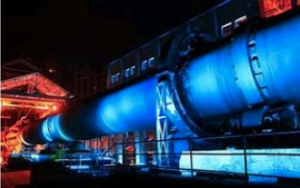Dr. John Clark - Clark Coking Consulting
 The major objective of the Delayed Coker Unit (DCU) is to extract maximum market value from crude oil derived heavy residues. The ability of the coke fraction to act as a stable sulphur (and other contaminant) “sink” intrinsically promotes the production of lighter, lower sulphur hydrocarbon fractions in high demand. However, evolving market requirements for the spectrum of DCU products may in future introduce both challenges and opportunities in future.
The major objective of the Delayed Coker Unit (DCU) is to extract maximum market value from crude oil derived heavy residues. The ability of the coke fraction to act as a stable sulphur (and other contaminant) “sink” intrinsically promotes the production of lighter, lower sulphur hydrocarbon fractions in high demand. However, evolving market requirements for the spectrum of DCU products may in future introduce both challenges and opportunities in future.
The evolving environmental footprint of DCU’s has only been partially realised over the larger sulphur refinery value chain. A case in point is the importance of the DCU in supplying increased demand volumes of lower sulphur shipping fuels (to fulfill IMO 2020 volume and quality mandates). However, the SOx emission reduction targets (attributed to IMO 2020 sulphur restrictions), will be largely negated if DCU fuel coke is incinerated in current energy markets. In this case it would merely constitute shifting sulphur emissions between DCU markets. In tandem with hydrotreating technologies, carbon rejection processes (inclusive of the DCU) will in future constitute a pivotal cog toward providing a realistic solution to reduce overall value chain sulphur emissions while supporting the increased demand for Marine Diesel Oil (MDO, IMO 2020) type derivatives. However, where the DCU diverts from other carbon rejection processes, is that sulphur may be stabilised in a solid, environmentally sustainable manner.
However, as national SOx emission targets evermore constrain energy markets, high sulphur fuel coke (in such markets) may prove a future disincentive. The impact of removing low value, high sulphur (up to 8%) fuel coke (global production of approximately 100 million tpa) on meeting forward looking SOx emission reduction targets would be attractive. As such, if non-energy market applications for fuel coke are not timeously developed it may not only serve to severely curtail current DCU operational mandates (introducing an environmental “bottleneck”), but limit required expansions to service market requirements for substantially higher volumes of low sulphur MDO derivatives. The potential “bottleneck” may be negated by developing non-energy applications for the coke. Indeed, the DCU’s ability to maximize the sulphur content in the coke fraction (for non-energy applications), may in future be utilised as an environmental marketing incentive thus positioning the DCU as an enabling refinery process. The paper discusses the nature of sulphur associations in DCU feeds and their predisposition towards stable complexes in the coke fraction. It further discusses how evolving shipping markets (IMO 2020) may be utilised as an environmental catalyst to further expand the comparative advantage of DCUs in the refinery’s conversion assets. The paper examines the realistic technical requirements of non-energy applications to absorb fuel coke volumes. The lower market value of fuel coke (compared to anode or needle varieties) in addition to marketable SOx emission reduction incentives, would further promote the transition to non-energy applications. The removal of fuel coke from the energy market may further serve to fast-track the inevitable introduction of cleaner burning fuels.
As the crude oil slates become heavier, associated volumes of intrinsic lighter distillate fractions will decrease. This is in market opposition to recent curtailments (IMO 2020) in the shipping market, rendering Heavy Fuel Oils (HFO, sulphur 3.5% max) unmarketable unless converted to lighter MDO derivatives (sulphur 0.5% max), typically utilising delayed coking. The ability of the DCU to enhance the supply of these MDO volumes may further offer opportunities for merchant DCUs in coastal hubs (within the fossil fuel era).
 Dr. John Clark is a delayed coker feedstock and coke specialist. His career spans 25 years in various DCU arenas spanning R&D, Operations, Product Development, Engineering and Business Development. He has contributed to international coke research programmes, commercial DCU production and safety platforms with reference to needle, anode and fuel grade cokes. He has developed award winning coke inventions which have been commercialised on the basis of their performance, environmental sustainability and ease of operational DCU up-scaling. In his 25 years of DCU experience, he has been employed by Sasol (Research and Development) and Sasol Synfuels Marketing, in delayed coke initiatives.
Dr. John Clark is a delayed coker feedstock and coke specialist. His career spans 25 years in various DCU arenas spanning R&D, Operations, Product Development, Engineering and Business Development. He has contributed to international coke research programmes, commercial DCU production and safety platforms with reference to needle, anode and fuel grade cokes. He has developed award winning coke inventions which have been commercialised on the basis of their performance, environmental sustainability and ease of operational DCU up-scaling. In his 25 years of DCU experience, he has been employed by Sasol (Research and Development) and Sasol Synfuels Marketing, in delayed coke initiatives.






